|
|
|
Sort Order |
|
|
|
Items / Page
|
|
|
|
|
|
|
| Srl | Item |
| 1 |
ID:
168279
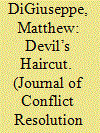

|
|
|
|
|
| Summary/Abstract |
When do private creditors versus debtor states accept a greater burden in resolving sovereign debt crises? In this study, we argue that distributive politics helps explain the “haircut”—or losses—private creditors take in debt restructuring cases. Despite the expected convergence of partisan policies in a globalized economy, we argue that right and left leaders extract different settlements in debt negotiations. Left governments, representing constituents most likely to be hurt from higher debt repayment, credibly demonstrate more bargaining power and extract greater concessions from creditors. Distributive politics, however, is an indeterminate factor in explaining states entrance into debt negotiations. We use recently released data on the outcome of sovereign debt restructuring cases between states and private creditors from 1975 to 2013 to test our expectations. Results from a double-hurdle model indicate that creditors receive a larger haircut when negotiating with left governments.
|
|
|
|
|
|
|
|
|
|
|
|
|
|
|
|
| 2 |
ID:
140282
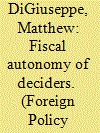

|
|
|
|
|
| Summary/Abstract |
Liberal theory claims that the constraint taxpayers impose on military expenditure is an important mechanism through which democracy and international commerce help prevent conflict. However, leaders with affordable access to sovereign credit have often overcome this constraint by raising revenue on credit markets. By minimizing or deferring the economic burden imposed on taxpayers and the macroeconomic stress associated with alternative financing strategies, I argue that these leaders have greater autonomy to pursue an aggressive foreign policy if they so desire. Leaders that lack creditor confidence risk increased political opposition and removal from office if hostilities generate macroeconomic stress or disturb the domestic fiscal balance. They also face a higher likelihood of defeat or retreat, and the subsequent political consequences, if they pursue conflict without sufficient resources. Estimates of a heteroskedastic probit model support this hypothesis and indicate that creditworthy states initiate conflict with a greater mean probability and greater variance than their noncreditworthy counterparts.
|
|
|
|
|
|
|
|
|
|
|
|
|
|
|
|
| 3 |
ID:
141234
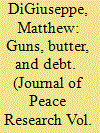

|
|
|
|
|
| Summary/Abstract |
I argue that favorable access to sovereign credit provides governments with greater autonomy to invest in security by allowing political incumbents to relax fixed-budget constraints. Borrowing permits leaders to delay and minimize the macroeconomic and redistributive costs associated with domestic sources of finance. Consequently, leaders of creditworthy states face fewer political costs when increasing military expenditure in response to growing demand or maintaining military expenditure when government revenues fall. A cross-sectional time-series analysis supports two observable implications of the argument. First, creditworthiness is positively associated with military spending with an effect on par with regime type. Second, creditworthiness conditions the effect of external threats on military expenditure, suggesting that poor credit terms constrain the provision of security.
|
|
|
|
|
|
|
|
|
|
|
|
|
|
|
|
| 4 |
ID:
141853
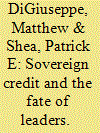

|
|
|
|
|
| Summary/Abstract |
In this article, we contend that the “democratic advantage” literature (i) exaggerates the potential political backlash from credit downgrades in democracies; and (ii) overlooks the importance of sovereign credit to nondemocratic leaders. We argue that nondemocratic regimes receive a higher marginal political benefit from credit compared to democratic regimes. Consequently, changes in credit prices or credit access affect nondemocratic leaders' tenure more than democratic leaders' tenure. To test this argument, we provide the first statistical examination of the electoral punishment mechanism of the “democratic advantage.” Our duration analysis shows that credit downgrades increase nondemocratic leaders' vulnerability more than that of their democratic peers. Our research reinforces the growing concerns about the conventional views about regime type, domestic constraints, and leaders' preferences toward sovereign credit and other political processes.
|
|
|
|
|
|
|
|
|
|
|
|
|
|
|
|
| 5 |
ID:
126471
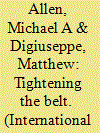

|
|
|
|
|
| Publication |
2013.
|
| Summary/Abstract |
International relations scholars have previously argued that states facing budget constraints will join alliances to free resources for domestic spending. In this paper, we focus on the primary mechanism by which leaders have relaxed this constraint: sovereign borrowing. Sovereign debt enables states to maintain stable tax rates while increasing expenditures to confront budgetary emergencies. Affordable access to credit, then, serves as both a source of power and an important buffer between security and the political consequences of fiscal policy. States that lack the confidence of investors must make tough choices between continued security and their electoral fortunes. We suggest that as governments lack access to affordable credit, they will substitute military capacity with alliance formation. Alliances provide a means for leaders to offset the loss of flexibility from diminished access to credit without disturbing the domestic political economy. Using previous models of alliance formation as a guide, our empirical evidence indicates that states that have a hard time borrowing are more likely to form an alliance than those states with affordable access to credit markets.
|
|
|
|
|
|
|
|
|
|
|
|
|
|
|
|
| 6 |
ID:
190883
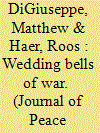

|
|
|
|
|
| Summary/Abstract |
Child marriage is a fundamental violation of human rights. It hinders progress towards development and public health goals. In this study, we argue that armed conflict plays an important role in the occurrence of child marriages; it influences the supply of and demand for young brides. We argue that in conflict settings, families are more willing to marry off their young daughters for protection. Armed conflict can also influence the demand: marriage in general declines due to an imbalance in sex ratio. However, in cases where belligerents use war tactics specifically focused on harming girls, such as sexual violence and girl recruitment, early marriage might increase as the result of armed conflict. To empirically examine these linkages, we combine the Demographic and Health Surveys of West Africa with information on the location of armed conflict. Our study shows that armed conflict generally reduces the occurrence of child marriage with 13% to 18%. However, we observe that when conflict actors use war tactics that specifically harm young girls there is a significant increase of 12% to 18% in the probability of a girl getting married before the age of 18. This research has important implications for our understanding of the relationship between armed conflict, gender inequality, and their impact on children.
|
|
|
|
|
|
|
|
|
|
|
|
|
|
|
|
|
|
|
|
|